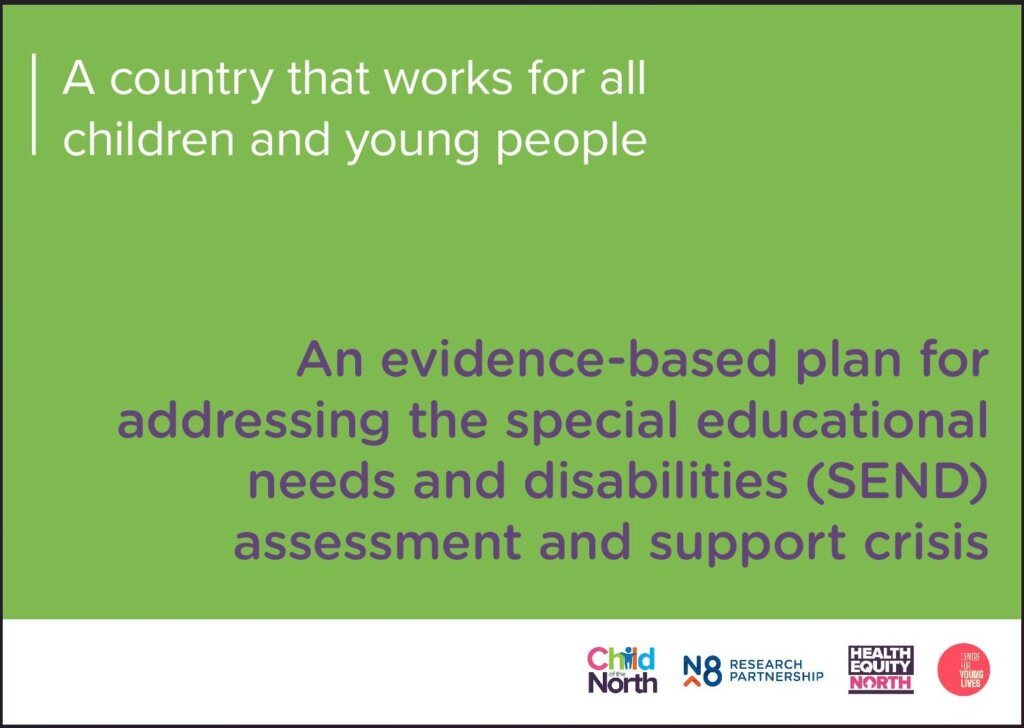Child of the North 2024/25 Campaign – Report 6
A country that works for all children and young people
An evidence-based plan for addressing the special educational needs and disabilities (SEND) assessment and support crisis
The sixth report in a year-long series – produced jointly by Child of the North and the Centre for Young Lives – that seeks to deliver a country that works for all children and young people, presents new evidence and analysis that reveals the scale of the crisis facing many children and young people with SEN(D), with some families waiting years for assessments.
The report, An evidence-based plan for addressing the special educational needs and disabilities (SEND) assessment and support crisis, puts forward a new evidence-based plan to support the new Government in its mission to widen opportunity, by tackling the poor identification of SEN(D), the postcode lottery of EHC plans, and reducing the huge numbers of children not receiving the support they need to reach their full potential.
It shows how the current system is failing many vulnerable children and young people with SEN(D). Over 1.5 million pupils in England have SEN(D), with 40% of children identified as having SEN(D) at some point between 5 and 16 years of age. Yet the current system cannot cope and has been unable to keep pace with advances made in identifying and recognising when children have additional needs and require extra support. 99% of school leaders have said that the funding they receive for pupils with SEN(D) is insufficient.
The report reveals how:
- In 2022, only 49% of Education, Health and Care (EHC) plans were produced within the 20-week statutory limit. The average wait for an ADHD assessment for young people aged 19-25 years is almost four years in one local authority in Yorkshire and the Humber.
- In 2022 the percentage of EHC plans produced within 20 weeks in the North East of England ranged from 98% to only 13%. Similar disparities are present in other regions, such as the North West and Yorkshire and the Humber. There is a clear postcode lottery in the timeliness in which EHC plans are produced.
- By the end of secondary school, the achievement gap between pupils with no identified SEN(D) and pupils with an EHC plan is almost 3.5 years. The gap between pupils with no identified SEN(D) and pupils with SEN support (but no EHC plan) is nearly 2 years.
- 32% of children with SEN(D) are persistently absent from school and children with SEN(D) are three times as likely to be suspended from school, nearly twice as likely to be persistently absent from school, and three times as likely to be ‘Not in Employment, Education or Training’ (NEET) at 16-17 years of age.
- The increasing demand for children and young people seeking assessment and support is placing significant pressure on the system. In 2021, councils faced a SEN(D) funding gap of £600 million.
The report makes a series of recommendations which offer the potential to cut the long-term costs of not acting early enough, including:
- Use holistic measures of child development to identify pupils with increased likelihood of having SEN(D). New evidence shows that assessments of academic and non-academic abilities can identify those children at increased likelihood of needing SEN(D) support. The Early Years Foundation Stage Profile (EYFSP), which assesses academic and non-academic abilities, can identify children who are more likely to require SEN(D) support in the future but is only conducted once in the early years. Tools that assess non-academic skills beyond the early years should be developed and rolled out nationally. The Electronic Development and Support Tool (EDST) is an innovative example of an assessment that has been developed to suit this purpose.
- Improve and extend training on SEN(D) for professionals and families. Most educational professionals will interact with and support children with SEN(D) every day but training on SEN(D) is limited. Many educational professionals want to receive more training, and others do not feel sufficiently confident to support children with SEN(D). Continuing Professional Development (CPD) courses on SEN(D) should be mandatory for educational professionals. Moreover, a “one stop shop” online resource should be developed to provide professionals and families with information and support on SEN(D).
- Connect systems more effectively to facilitate earlier identification of SEN(D) and the provision of more appropriate support. Public services, such as education, health, and social care, often work in silos. As a result, information like health conditions or birth factors that may facilitate earlier identification of SEN(D) is rarely communicated directly with schools. Better connected public services would enable free sharing of information, speeding up identification of SEN(D) and reducing structural inequalities.
The report also highlights a range of innovative approaches, illustrating the incredible work that schools, universities, teachers, researchers, and others are undertaking to ensure the best possible SEN(D) provision.
Report Webinar
Save the date at 4-5pm on Wednesday 14th August for a webinar in which a number of the report’s authors will be discussing the findings and policy recommendations. Confirmed speakers include:
- Amy Atkinson (Lancaster University)
- Uta Papen (Lancaster University)
- Jennifer Duncan (Tees Valley Education)
- Shannon Hatton-Corcoran (Trafford Emotionally Based School Non-Attendance Working Group)
To join the webinar, please follow this link: https://us06web.zoom.us/j/83592658128
Anne Longfield, Executive Chair of the Centre for Young Lives, said:
“The SEND system is broken. Many families talk about the traumatic impact it has on their lives as they struggle to find support for their children. They are often at their wits’ end, deeply frustrated at the waiting lists and the layers of bureaucracy and hoops they need to jump through, fearful that their children’s opportunities to do well at school and beyond are being held back by an inadequate, underfunded, and overstretched system.
“Tackling the delays, the poor early identification, and the postcode lottery they have inherited should be a priority for new Ministers. This report puts forward a new evidence-based plan to identify SEND earlier and cut assessment times.
“I welcome the new Secretary of State’s decision to give responsibility for improving SEND provision to the Schools Minister, and I hope this is the beginning of a fresh start for reforming a broken system.
“We need to level the playing field of support nationally, prioritising those areas of the country which are failing to meet the 20-week goal, and being much more creative about how to achieve it.
“Ensuring that children with SEND have the support they need will also be essential to tackling the school attendance crisis, supporting all children to flourish and succeed in school, and to meeting the new Government’s ambitions to widen opportunity.”
Professor Mark Mon Williams, Child of the North report series editor, said:
“Our collective failure to support SEND is a millstone around the neck of the UK. The new government will improve the lives of millions of children and grow the economy by ‘following the evidence’. The time has come to support every child to thrive in school, and ensure the benefits of a healthy and well educated population are reaped by the UK.”
Dr Amy Atkinson, Lancaster University and Report Author, said:
“The current SEND system is failing children and young people. Urgent action is needed to ensure that children, young people, and their families receive the support they need and are entitled to.”
Professor Uta Papen, Lancaster University and Report Author, said:
“The SEND system is in crisis. There’s a postcode lottery, children and families experience very long waiting times and schools, despite best intentions, more often than not, don’t have the resources to help all children in the way they’d like to. But there’s a lot we can do. Our report, drawing on evidence based practices and new research illustrates a number of promising approaches and solutions ready to be adopted widely and promising to make a real difference to children and young people with SEND.”
Sign up for updates on our 2024/25 Campaign
We will only use this data for the purposes of providing updates on the Child of the North 2024/25 campaign and report series. For more information see the Privacy Policy at https://www.sheffield.ac.uk/privacy
Previous Reports
Previous reports can be found archived on our Child of the North Reports page.
Contact Us
Stephen Parkinson, Research Partnership Manager




